#christopher isherwood
Text

Christopher Isherwood's diaries, September 8, 1960
4K notes
·
View notes
Text

Christopher Isherwood, A Single Man [ID'd]
887 notes
·
View notes
Text

David Hockney (British, 1937), Christopher Isherwood's House, Santa Monica, 1966. Ink on paper.
711 notes
·
View notes
Photo


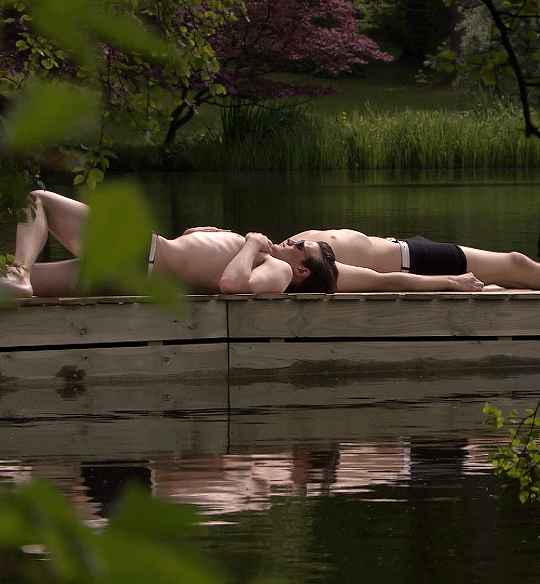
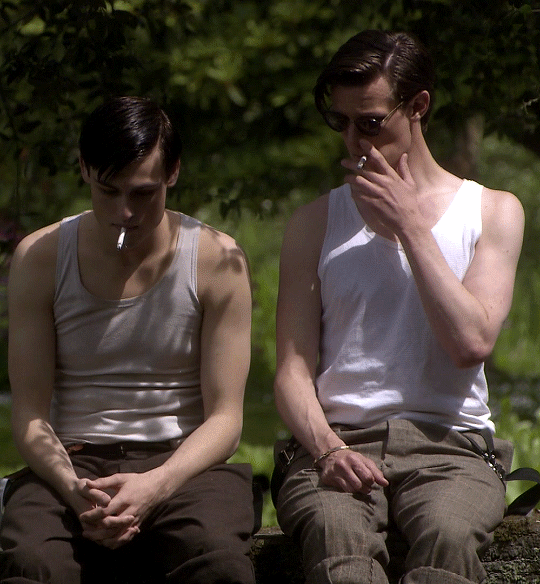

MATT SMITH and DOUGLAS BOOTH
Christopher and His Kind (2011) dir. Geoffrey Sax
#matt smith#mattsmithedit#douglas booth#douglasboothedit#christopher and his kind#cahk#cahkedit#christopher isherwood#heinz neddermayer#movie#film#filmedit#filmgifs#moviegifs#romancegifs#lgbt#lgbtedit#gay#gayedit#gaygifs#actors#men#menedit#gifs#mine#*#dailyflicks#cinematv#tvandfilm
2K notes
·
View notes
Text



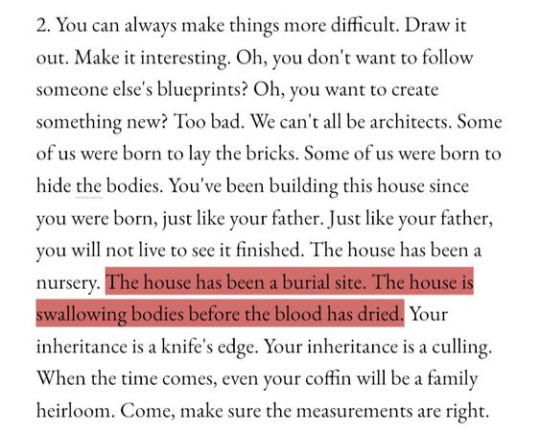




Jennifer Lynch The Secret Diary of Laura Palmer / Lady Bird (2017) dir. Greta Gerwig / James Baldwin Giovanni's Room / @filmnoirsbian / Warsan Shire Teaching My Mother How To Give Birth / Fatimah Asghar How'd Your Parents Die Again? / Christopher Isherwood A Single Man / Lorde Buzzcut Season
#on childhood#on family#on growing up#poetry parallels#web weave#web weaving#poetry compilation#jennifer lynch#the secret diary of laura palmer#lady bird#greta gerwig#james baldwin#giovanni's room#warsan shire#teaching my mother how to give birth#fatimah asghar#how'd your parents die again?#christopher isherwood#a single man#lorde#buzzcut season#poem#spilled poetry#spilled thoughts#poetry#spilled ink#dark academia#words#dark academia quote#dark academia poetry
857 notes
·
View notes
Text

Don Bachardy: Portrait of Christopher Isherwood
69 notes
·
View notes
Text
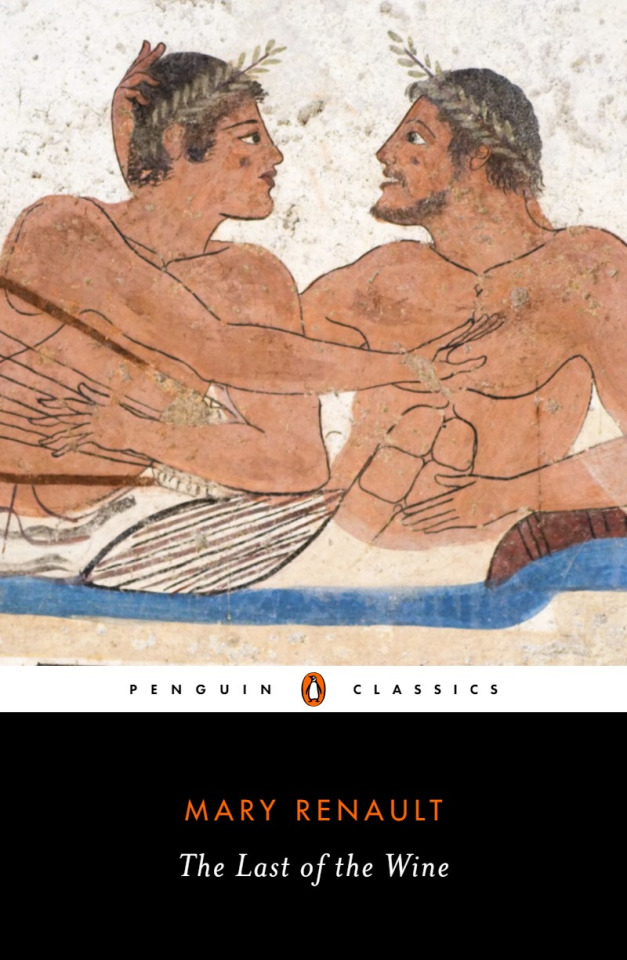

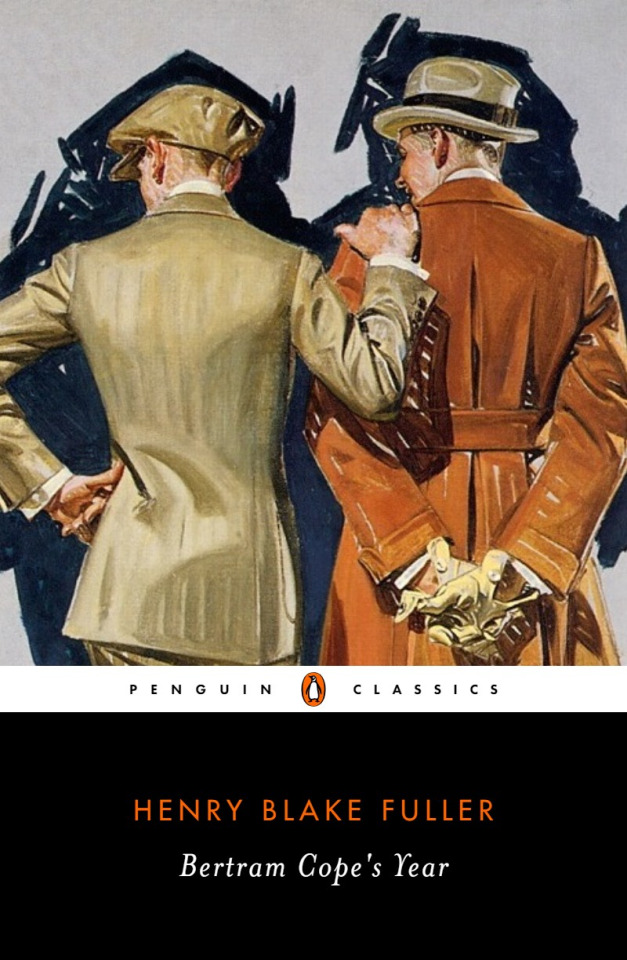


More Penguin Classics covers for old gay novels.
(Part 1)
#book covers#penguin classics#penguin covers#the last of the wine#a single man#bertram cope's year#maurice#wingmen#mary renault#christopher isherwood#henry blake fuller#e. m. forster#ensan case#gay literature#lgbt literature#gay#mlm#books#booklr
229 notes
·
View notes
Text
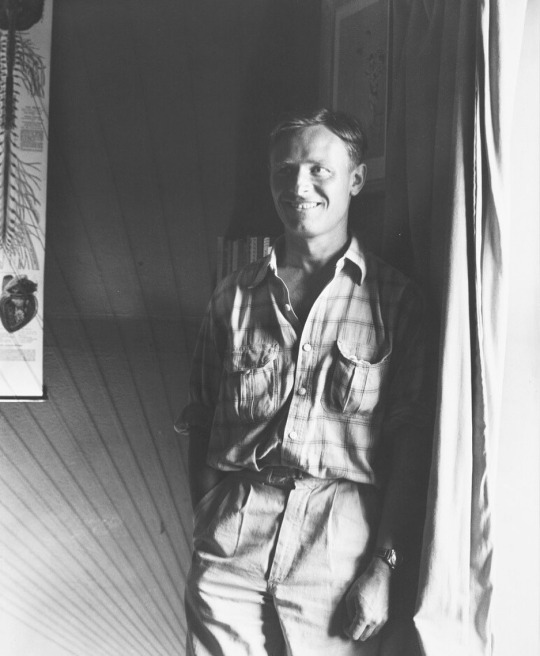
Christopher Isherwood (ca. 1935), photo by George Platt Llynes
#christopher isherwood#george platt lynes#vintage portrait#male portrait#gay history#lgbtq history#lgbt history#vintage fashion#male style#literature#cabaret#a single man#gay literature#gay male#gay man
128 notes
·
View notes
Text

George Platt Lynes (American, 1907–1955), Christopher Isherwood, c.1935
189 notes
·
View notes
Text

Christopher and His Kind (1976) written by Christopher Isherwood.
Published in 1976, Isherwood has said that he wrote Christopher and His Kind because he felt he had a moral obligation to renounce the self censorship that marked his early novels, specifically the excision of any hint of his homosexuality. Accordingly, in Christopher and His Kind, he recounts his experiences as a young
gay expatriate enticed by the liberated atmosphere of Weimar Berlin into a quest for sexual and intellectual emancipation.
#classic#gay#art#gay art#gay artist#gay writing#gay history#christopher isherwood#christopher and his kind#gay literature
50 notes
·
View notes
Text
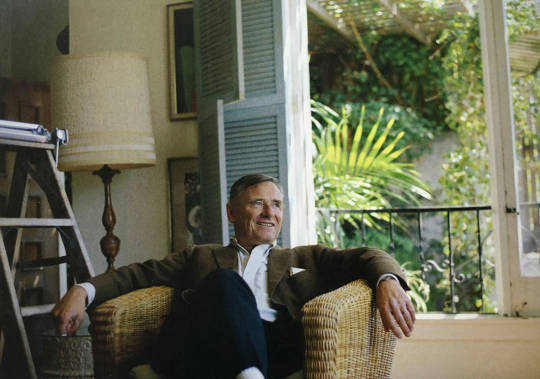
Christopher Isherwood | Peter Schlesinger
32 notes
·
View notes
Text
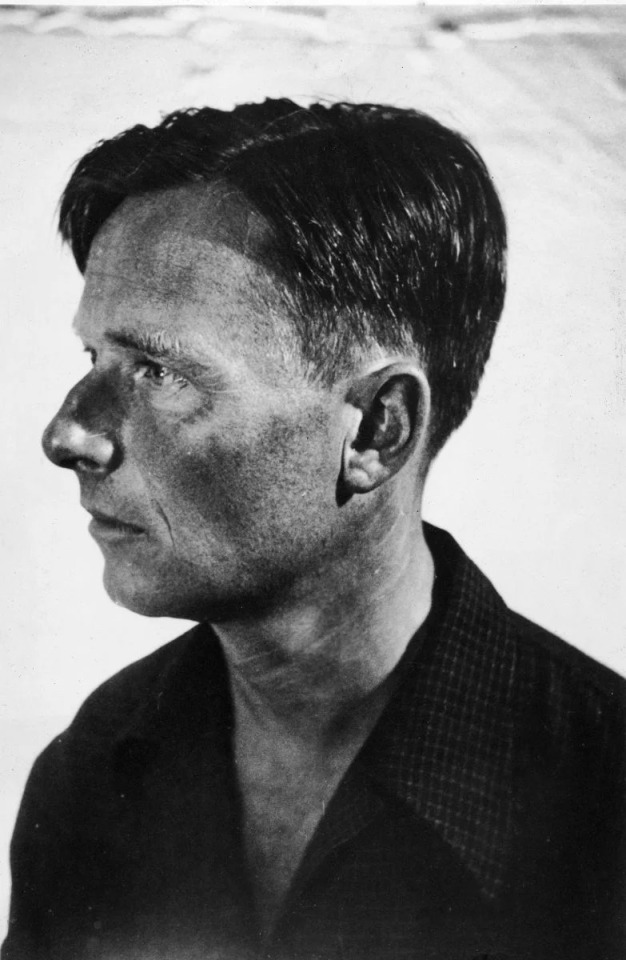
Christopher Isherwood, August 26, 1904 – January 4, 1986.
69 notes
·
View notes
Text


Christopher & His Kind - Matt Smith & Douglas Booth for Jason
25 notes
·
View notes
Text
Some stuff about queer culture in Weimar Berlin
Note: Das Institut für Sexualwissenschaft does not have a definitively used translation from what I see -- have seen Institute of Sexology (my preferred translation), Sexual Science, Sexual Research, Sexual Knowledge etc. It’s all the same place.
any further suggestions, feel very welcome to add!
*
ONLINE:
the wikipedia for the institute: yeah, yeah it’s wikipedia, but get some groundwork done here if you know nothing at all, so the next set of recommendations don’t overwhelm you
Remembering Dora Richter, One of the First Women to receive Gender-Affirming Surgery: good introduction to the Institute of Sexology, with a focus on one of the women who lived, worked, and received care there
On the Clinics and Bars of Weimar Berlin: a more in-depth article about the institute, some of the people who sought to get support via it, and the surrounding culture of the time
The Magnus Hirschfeld Society: a lot of their work is published online, in German, French, and English. Hours of fun.
Interview with the author Laurie Marhoefer: discussing his book (mentioned below) Sex and the Weimar Republic, which focuses on various fronts to sexual liberation in the Weimar Republic, including the limitations of assimilationist approaches*
*Marhoefer is currently working on their third book centred on queer persecution during the Third Reich, which “centrally analyzes racism as a vector of persecution,” so that’s something to keep an eye out for too
The Asian Canadian gay activist whose theories on sexuality were decades ahead of their time: an article about Li Shiu Tong, by Marhoefer, who also wrote a book about him (see below). The title really says it all
The Transvestite Magazine of Weimar Berlin: a series of magazines that were published until 1933 when the crackdown on queer rights resulted in the destruction of the Institute of Sexology, featuring examples of voices almost completely overlooked -- transvestites who were simply living their lives
The Institute for Sexualwissenschaft: this blog post goes into something I’ve been thinking as well -- the parallels between the anti-queer/anti-trans violence perpetuated by the German government before, during, and after the Nazis and the anti-queer/anti-trans rhetoric and violence today. Where would we be if all that research had survived? (and luckily, some of it has!)
*
BOOKS
Der Liebe und Dem Leid: Das Institut für Sexualwissenschaft 1919-1933: a recent German historical account of the institute of Sexology that I desperately want to get my hands on
Sex and the Weimar Republic: German Homosexual Emancipation and the Rise of the Nazis: explores intersectional fights for queer emancipation during the Weimar Republic and its limitations
Racism and the Making of Gay Rights: A Sexologist, His Student, and the Empire of Queer Love: goes deeper into the story of Li Shiu Tong, who was an impressive researcher at the institute and whose contribution to sexual and gender philosophies is being reconsidered at the moment!
Magnus Hirschfeld: The Origins of the Gay Liberation Movement: a biography of Magnus Hirschfeld and his central role in the queer liberation movement of the time
The Masculine Woman in Weimar Germany: looks at the depictions of women who didn’t conform to standard gendered and sexual expectations from 1918-1933 and explores their role to understand gendered lives and experiences at this point in German history
The Hirschfeld Archives: Violence, Death, and Modern Queer Culture: a book I desperately want to read on anti-queer violence in the early 20th century, focusing on the Institute of Sexology and its destruction, which has gathered archival material from “over a hundred published and unpublished books, articles, films and photographs.”
Gay Berlin: Birthplace of a Modern Identity: another broader book about Berlin. I’m interested in the subtitle “birthplace of a modern identity” as potentially exploring the ways Berlin was the centre of explorations that despite the Nazis best efforts are still alive and -- with setbacks -- remembered today
Queer Identities and Politics in Germany: A History, 1880-1945: Idk what to tellya it’s about queer identities and politics in Germany between 1880-1945
*
ISHERWOOD
British author Christopher Isherwood spent some time in Berlin, notably including a stay at the Institute of Sexology. This time resulted in “The Berlin Stories,” as well as a section in “Christopher and his Kind” (his autobiography).
These stories were turned into the play+film “I Am A Camera” and the musical+movie “Cabaret”
The 1993 Alan Cumming and Jane Horrocks Cabaret (one of my favourite things in the world)
Opening of the 1972 movie
(according to a 1977 biography of Isherwood, he denounced the Berlin Stories in a 1956 essay: “He regretted depicting many persons as "monsters" and noted they were "ordinary human beings prosaically engaged in getting their living through illegal methods. The only genuine monster was the young foreigner who passed gaily through these scenes of desolation, misinterpreting them to suit his childish fantasy."” -- that being said, the people in those books are still very, very interesting and -- despite Isherwood’s initial limitations/biases -- beautiful in their realities)
*
OTHER MOVIES
Anders als die Andern and Laws of Love -- two movies produced via the institute exploring same-sex relationship rights. I haven’t seen the latter yet (it was only restored in 2021, nearly a hundred years after it was released), but it was heavily censored. The former (with the famous German actor Conrad Veidt as a lead) is considered the first movie to overtly show homosexuality. They’re both on the Internet Archive
The Einstein of Sex: Life and Work of Dr. M. Hirschfeld: by cult film-maker Rosa von Praunheim that explores the opening of the institute up until the 30s. I haven’t seen it yet, but very excited! EDIT: currently watching and it’s definitely On A Budget, but a good rundown of Hirschfeld’s life. On youtube with english subs. EDIT 2: having finished it, am interested in how it portrayed Dora Richter (that it had her in it at all was great) -- not completely accurate, but a labour of love
Paragraph 175: a 2000 movie documenting some of the gay men who experienced the violence of the law under Nazi regime and afterwards. This film is simply made, and there aren’t many men featured in it -- it feels like it’s trying to get the story told before they lost their chance completely. The stories are very brutal. It starts pre-war. One of the men talking is the French author Pierre Seel, who lived until 2005 and received recognition as a holocaust survivor in 2003, in part due to this film and his own memoir
Great Freedom: this actually takes place post-war, but another insight into what Paragraph 175 was. the main character was in a concentration camp, but it’s not depicted. I simply think it’s good, although it’s mildly off-topic.
*
MISC
this has focused a lot on the Institute of Sexology, but I’d like to read some works on Helene Stöcker and the World League for Sexual Reform
#resources#queer stuff#queer resources#weimar berlin#magnus hirschfeld#li shiu tong#laurie marhoefer#heike bauer#paragraph 175#die institut für sexualwissenschaft#weimar germany#cabaret#christopher isherwood#queer history#queer germany#germany#queer literature#queer non-fiction#queer cinema
163 notes
·
View notes
Text
what seems like forever ago, @geryone so kindly tagged me and asked me to share nine book recommendations. after combing through some of my recent reads, here are some of my favorites:
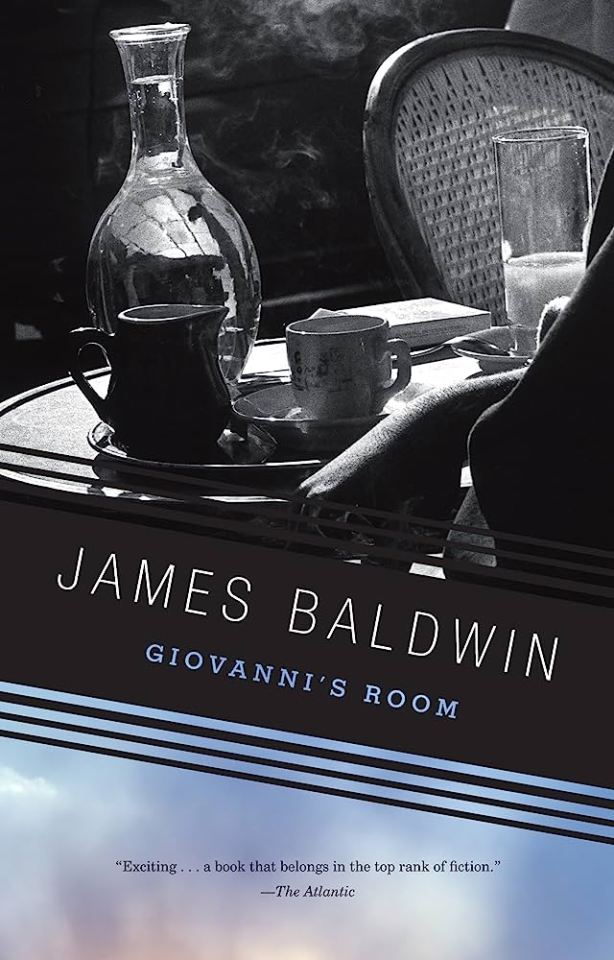
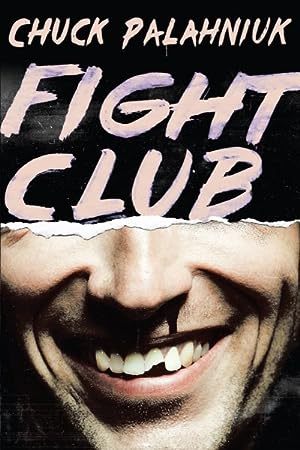
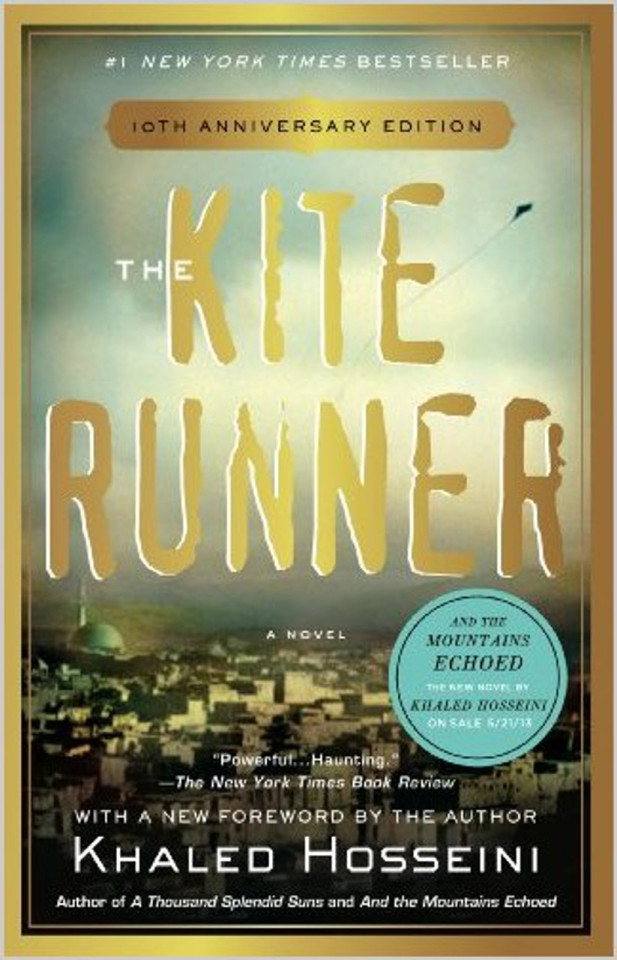
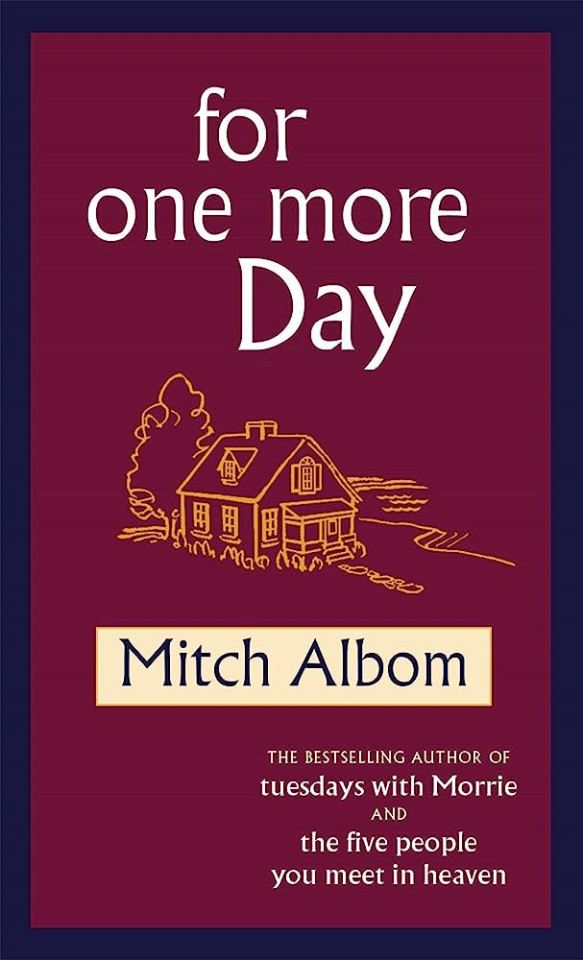
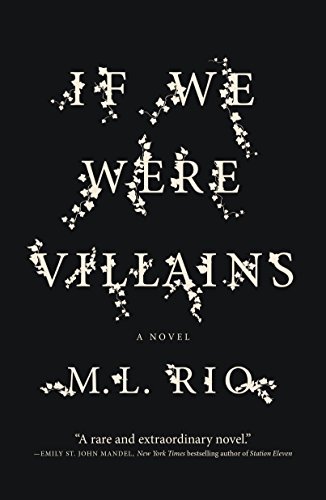
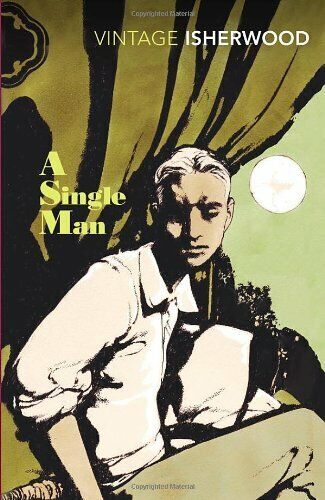
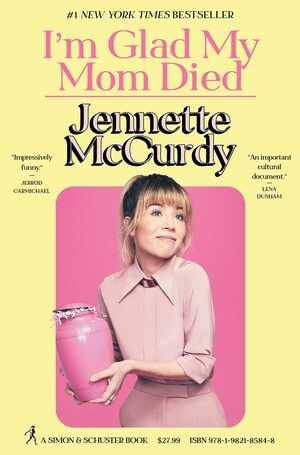
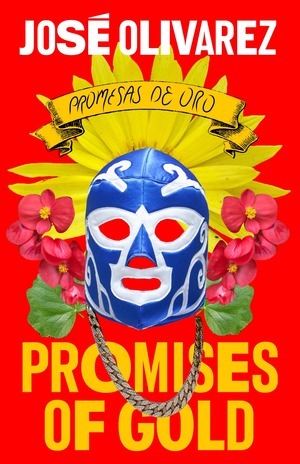
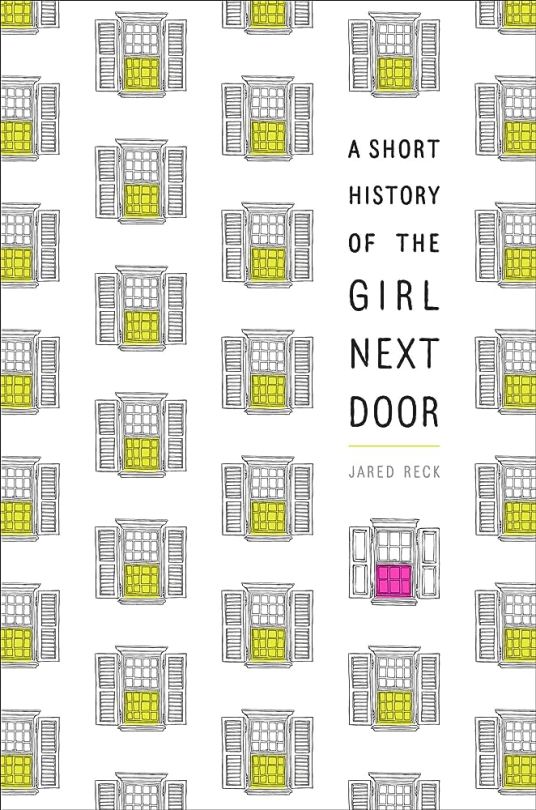
My short little summaries and thoughts are listed under the cut:
Giovanni's Room by James Baldwin - Giovanni's Room is about a young man in David and his summer romance with another young man named Giovanni. Through the lens of love and heartbreak, David goes through a journey of identity.
Fight Club by Chuck Palahniuk - We follow our narrator, for now we can call him Joe, as he begins a very unconventional friendship with a man named Tyler. Men fight, they also bite and many a problems arise.
The Kite Runner by Khaled Hosseini- Historical fiction novel that is set agains the backdrop of many events from the fall of Afghanistan's monarchy to the rise of the Taliban regime. I don't think I've cried harder reading a book so that's my own weird way of saying I can't recommend it enough.
For One More Day by Mitch Albom- Little read with a lot of heart. Fictional baseball player has the chance to spend one more day with his late mother, who he misses more than he ever thought he would. Another book that kept me crying into the middle of the night.
If We Were Villains by M.L. Rio - I feel like if you like dark academia; this is an essential. A group of Shakespearean acting students at the fictional Dellecher Shakespeare conservatory get wrapped in a murder and it's an ongoing case of whodunit.
A Single Man by Christopher Isherwood - A delicate look into the mundane crafted through the lens of grief, loss and heartache. We follow the life of George, a middle-aged gay man mourning the loss of his partner. Like Giovanni's Room, I think it's a staple of queer literature.
I'm Glad My Mom Died by Jennette McCurdy - A heartbreaking memoir that's sprinkled with the well timed moment of comedy. We learn about Jennette McCurdy's tumultuous relationship with acting, the abuse she suffered at the hands of her mother, and her own way of working towards healing.
Promises of Gold by José Olivarez - If prose isn't your thing; this might be! Promises of Gold is a poetry collection in which Olivarez family, identity, love and quarantine. One of my personal favorites is Regret or My Dad Says Love
A Short History of the Girl Next Door by Jared Reck - A story about first love that in ends heartbreak in more ways that one. It's first person and it's YA, two things I normally never read, but it's just so so good. Forget crying into the middle of the night, this had me crying well into morning
no pressure tagging: @firstfullmoon and @soracities if you have anything you want to recommend <3
#these are a few of my favorite things#giovanni's room#james baldwin#fight club#chuck palahniuk#the kite runner#khaled hosseini#for one more day#mitch albom#if we were villains#m.l. rio#a single man#christopher isherwood#i'm glad my mom died#jennette mccurdy#promises of gold#josé olivarez#a short history of the girl next door#book review#book recommendations
53 notes
·
View notes
Text
E.M. Forster's journal entries relating to Maurice in his "Locked Diary"
Apologies in advance—I only had about an hour in the library to skim through the entire source, "The Journals and Diaries of E.M. Forster vol 2", which contains every journal entry of Forster from 1910 to the late 1960's. I thus probably missed some mentions of Maurice. But surprisingly, there were much fewer Maurice entries than expected—and many are short and subtle.
6th December, 1913:
The first mention of Maurice: "my novel goes slower."
(Some context: the short story mentioned here is Forster's gay erotic story which "shocked" his mentor Dickinson—and caused a rift between them. Meredith is the real-life Clive Durham who read Maurice's writing in progress and was utterly repelled by the story.)

31st December, 1913:
The second mention is also the most important and iconic one: "Edward Carpenter! Edward Carpenter! Edward Carpenter!"
The entry is a part of Forster's 1913 end-of-year reflection. It shows Forster mentally struggling with whether to proceed with the novel. It's also confirmed that the day he formulated the love story in his mond during his visit to Edward Carpenter and George Merrill—the real-life Maurice and Alec—is 13th of September, 1913.
Also, the Greenwood here is not the same greenwood Maurice and Alec escape to. It's Leonard Greenwood, a close confidante of Forster who was very important in producing and preserving the first manuscript of Maurice, and who fell apart with Forster later.


June, 1914:
Completely my fault—I failed to capture the exact date and wider context, but I do remember it being a very brief mention of Maurice in the summer of 1914.

31st December, 1914:
Another end of year reflection. We see that Forster was able to mend his relationship with Dickinson who liked and approved Maurice. Also, we can guess of Meredith (H.O.M.)'s continuing aversion to the novel, Greenwood's relationship with Forster deteriorating, and Forster feeling indebted to Edward Carpenter (E.C.).

(The next and last entry about Maurice I found is from the '1950s... I might have missed some mentions. But it must be noted that Maurice was revised many times between 1914 and 1959. There was even a point in 1932 when Forster finalized a manuscript that had a much less satisfying ending between Maurice and Alec without the epilogue.
Forster's letters with his friends who've read Maurice do show us his own thoughts on the story's ending as well as what drove his revisions across decades. His diary, however, does not.)
31st December, 1952 and 1st January, 1953:
Context: in 1951/1952, Forster was encouraged by another gay novelist Christopher Isherwood to add more scenes between Maurice and Alec, and so Forster did, enthusiastically and very quickly—after many years of refusing Isherwood's requests to add more scenes (we don't know what Isherwood said to Forster to sway him). Hence, the hotel chapter after the British museum was manually added to the 1932 finalized manuscript—clipped in, actually. The "Maurice's end" mentioned here is probably not the hotel chapter, however, but likely Maurice's final farewell to Clive.

That's it. Though the novel wasn't completely finalized until 1959 when Forster managed to unite Maurice and Alec at the boathouse in explicit writing. Before then, their reunion was only implied, which is why the 1932 ending is a big let-down since it didn't have the monologue.
Lastly, some interesting diary entries from Forster:
Why was Forster drawn to lower class men? Carpenter explained himself.

2. Forster moving on from his first love Mohammed el Adl, a lower-class Egyptian who ended up marrying a woman and likely broke up with Forster on very bad terms. (Spoiler alert: Forster failed to move on... Plenty of mentions and entries about Mohammed later on.)
Context: the relationship between Mohammed and Forster is much like the one between Maurice and Alec—they probably had their own episodes about class struggles and "blackmail" in real life—except the happy ending.

3. Um... Did Forster and Bob have a lot of rough sex?
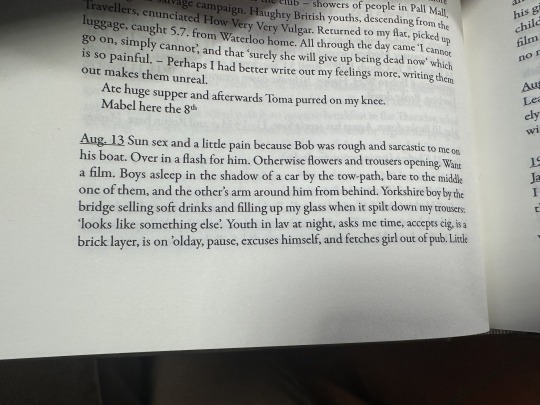
4. Lastly, some mentions of Edward Carpenter and George Merrill in his diaries after Forster became neighbor with them since they moved from Millthorpe to Guilford.
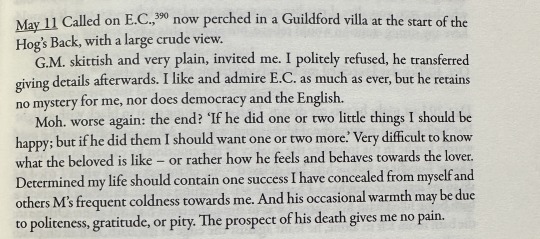

I like how George Merrill is described as "skittish". You'll know it's very characteristic of him if you've read Edward Carpenter's biography on George Merrill.
Context: Moh. refers to Mohammed. This was around 1922 after Mohammed left Forster and got married and then died. We can see that the end of their time together was rather unpleasant.
Source: The Journals and Diaries of E M Forster Vol 2 by Philip Gardner
#maurice#maurice em forster#maurice 1987#maurice hall#em forster#edward carpenter#george merrill#clive durham#alec scudder#em forster maurice#Christopher Isherwood#Bob Buckingham#secret journal#diaries#gay books#gay novel#1900s#edwardian era
142 notes
·
View notes